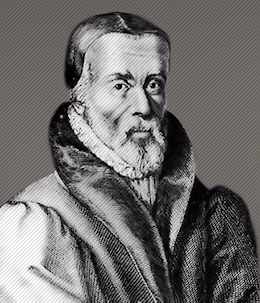Textus Receptus Bibles
William Tyndale Bible 1534
New Testament
| 4:1 | And I saye that the heyre as longe as he is a chylde differth not from a servaunt though he be Lorde of all |
| 4:2 | but is vnder tuters and governers vntill the tyme appoynted of the father. |
| 4:3 | Even so we as longe as we were chyldren were in bondage vnder the ordinaunces of the worlde. |
| 4:4 | But when the tyme was full come God sent his sonne borne of a woman and made bonde vnto ye lawe |
| 4:5 | to redeme the which were vnder the lawe: yt we thorow eleccion myght receave the inheritauce yt belongeth vnto the naturall sonnes. |
| 4:6 | Be cause ye are sonnes God hath sent the sprete of his sonne in to oure hertes which cryeth Abba father. |
| 4:7 | Wherfore now thou art not a servaunt but a sonne. Yf thou be ye sonne thou arte also the heyre of God thorow Christ. |
| 4:8 | Notwithstondinge whe ye knewe not God ye dyd service vnto them which by nature were no goddes. |
| 4:9 | But now seinge ye knowe god (yee rather are knowe of God) how is it that ye tourne agayne vnto the weake and bedgarly cerimonies whervnto agayne ye desyre afresshe to be in bondage? |
| 4:10 | Ye observe dayes and monethes and tymes and yeares. |
| 4:11 | I am in feare of you lest I have bestowed on you laboure in vayne. |
| 4:12 | Brethern I besech you be ye as I am: for I am as ye are. Ye have not hurte me at all. |
| 4:13 | Ye knowe how thorow infirmite of the flesshe I preached the gospell vnto you at the fyrst. |
| 4:14 | And my temptacion which I suffered by reason of my flesshe ye despysed not nether abhorred: but receaved me as an angell of god: ye as Christ Iesus. |
| 4:15 | How happy were ye then? for I beare you recorde that yf it had bene possible ye wolde have plucked out youre awne eyes and have geven them to me. |
| 4:16 | Am I therfore become youre enemie because I tell you the truth? |
| 4:17 | They are gelous over you amysse. Ye they intede to exclude you that ye shuld be feruet to them warde. |
| 4:18 | It is good alwayes to be fervent so it be in a good thinge and not only whe I am present with you. |
| 4:19 | My littel children (of whom I travayle in birth againe vntill Christ be fassioned in you) |
| 4:20 | I wolde I were with you now and coulde chaunge my voyce: for I stonde in a doute of you |
| 4:21 | Tell me ye that desyre to be vnder the lawe have ye not hearde of the lawe? |
| 4:22 | For it is written that Abraham had two sonnes ye one by a bonde mayde the other by a fre woman. |
| 4:23 | Yee and he which was of the bonde woman was borne after the flesshe: but he which was of the fre woman was borne by promes. |
| 4:24 | Which thinges betoken mystery. For these wemen are two testamentes the one fro the mounte Sina which gendreth vnto bondage which is Agar. |
| 4:25 | For mounte Sina is called Agar in Arabia and bordreth vpo the citie which is now Ierusalem and is in bondage with her chyldren. |
| 4:26 | But Ierusalem which is above is fre: which is the mother of vs all. |
| 4:27 | For it is written: reioyce thou bare that bearest no chyldre: breake forthe and crye thou that travelest not. For the desolate hath many moo chyldren then she which hath an husband. |
| 4:28 | Brethre we are after the maner of Isaac chyldren of promes. |
| 4:29 | But as then he yt was borne carnally persecuted him that was borne spiritually. Even so is it now. |
| 4:30 | Neverthelesse what sayth the scripture: put awaye the bonde woman and her sonne. For the sonne of the bonde woma shall not be heyre with the sonne of ye fre woman. |
| 4:31 | So then brethren we are not chyldre of the bonde woman: but of the fre woman. |

William Tyndale Bible 1534
William Tyndale was the first man to ever print the New Testament in the English language. Tyndale also went on to be the first to translate much of the Old Testament from the original Hebrew into English, but he was executed in 1536 for the "crime" of printing the scriptures in English before he could personally complete the printing of an entire Bible. His friends Myles Coverdale, and John [Thomas Matthew] Rogers, managed to evade arrest and publish entire Bibles in the English language for the first time, and within one year of Tyndale's death. These Bibles were primarily the work of William Tyndale.